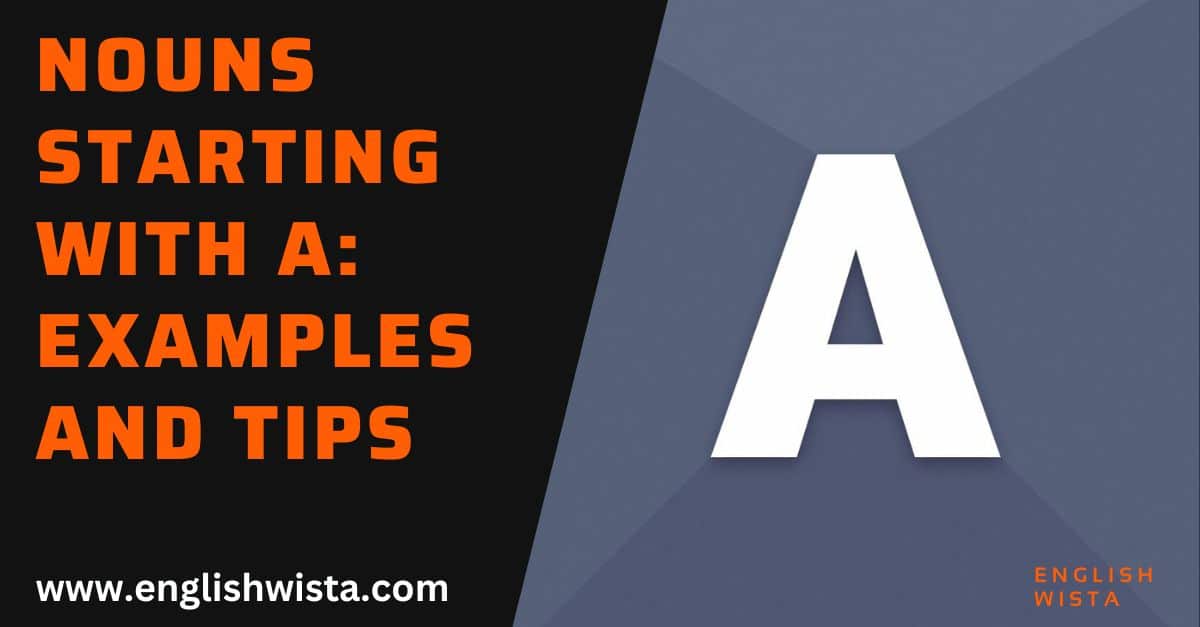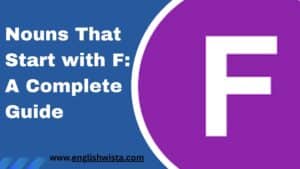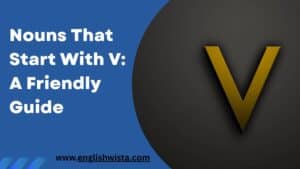A World of “A” Nouns
Have you ever wondered how often you use nouns starting with the letter “A” in your daily life? Think about it: “apple,” “airport,” “artist,” and even “adventure.” These words sneak into our conversations all the time! But what exactly makes a noun, and why is the letter “A” such a rich source of them? If you’ve ever been curious or confused, don’t worry—we’re here to explore the topic step by step in a fun and simple way. By the end of this article, you’ll have a better grasp of nouns beginning with “A,” plus plenty of examples to enrich your vocabulary.
Let’s dive in!
What Is a Noun?
Before we explore nouns starting with “A,” let’s cover the basics. A noun is a word that names a person, place, thing, or idea. In simple terms, if you can see, touch, name, or think about it, there’s a good chance it’s a noun. For example:
- Person: artist, actor, aunt
- Place: Africa, aquarium, avenue
- Thing: apple, airplane, album
- Idea: ambition, anger, anxiety
Why Are Nouns Important?
Nouns are like the building blocks of language. Imagine trying to describe your day without naming anything! Nouns help us communicate clearly, whether we’re telling a story, giving directions, or sharing our feelings.
Exploring Common “A” Nouns
Now that we’ve got the basics down, let’s look at some nouns starting with “A.” To make it easier, we’ll divide them into categories.
People and Roles
These nouns refer to people or the roles they play. Here are some examples:
- Artist: A person who creates art. “The artist painted a beautiful mural.”
- Author: Someone who writes books, articles, or stories. “J.K. Rowling is a famous author.”
- Athlete: A person who participates in sports. “The athlete trained hard for the Olympics.”
- Aunt: Your parent’s sister. “My aunt loves baking cookies.”
Places
Nouns that describe locations or specific places often start with “A.”
- Airport: A place where planes take off and land. “We arrived at the airport early.”
- Africa: A continent. “Africa is known for its rich culture and wildlife.”
- Aquarium: A place where aquatic animals are kept. “The kids enjoyed watching the fish at the aquarium.”
- Avenue: A wide street. “Her office is on Fifth Avenue.”
Things
Let’s move on to physical objects. These “A” nouns are everywhere in daily life:
- Apple: A popular fruit. “I eat an apple every day.”
- Airplane: A vehicle that flies. “The airplane landed smoothly.”
- Album: A collection of songs or photos. “She showed me her photo album.”
- Anchor: A device that keeps a ship in place. “The anchor was dropped into the sea.”
Ideas and Feelings
Not all nouns are tangible; some represent abstract concepts or emotions.
- Ambition: A strong desire to achieve something. “Her ambition is to become a doctor.”
- Anger: A feeling of annoyance or hostility. “He struggled to control his anger.”
- Anxiety: A feeling of worry or unease. “Public speaking gives me anxiety.”
- Appreciation: Gratitude or recognition. “She expressed her appreciation with a thank-you note.”
Singular or Plural?
One question that often pops up is whether a noun is singular or plural. Here’s a simple rule: if it refers to one thing, it’s singular; if it refers to more than one, it’s plural. For example:
- Singular: apple, aunt, artist
- Plural: apples, aunts, artists
Some nouns change spelling when pluralized, but most “A” nouns simply add an “-s.” Easy, right?
Real-Life Examples of “A” Nouns in Action
Using these nouns in sentences helps solidify your understanding. Here are a few examples:
- Person: “The artist sketched a portrait of the athlete.”
- Place: “Africa is home to incredible wildlife, including elephants.”
- Thing: “She packed an apple and an album for her trip.”
- Idea: “His ambition pushed him to work harder.”
Notice how nouns fit naturally into everyday language? Try thinking of your own examples for practice.
Fun Facts About “A” Nouns
Learning is more fun with a few interesting tidbits. Here are some fascinating facts about nouns that start with “A”:
- Collective Nouns: Did you know a group of ants is called an “army”? Or that a group of angels is known as a “host”?
- Etymology: The word “apple” comes from Old English “æppel,” which also meant fruit in general.
- Unique Nouns: The word “aardvark” (a nocturnal animal) is one of the first words in many dictionaries. Its name comes from Afrikaans, meaning “earth pig.”
How to Expand Your Vocabulary
Learning nouns starting with “A” is just the beginning! Here are some tips to grow your word bank:
- Read Daily: Books, articles, or even captions can introduce you to new words.
- Make Lists: Write down interesting nouns you hear or read. Start with “A” and work through the alphabet.
- Play Word Games: Try Scrabble, crosswords, or word search puzzles.
- Practice: Use new nouns in your writing or conversations.
Conclusion: Your Adventure with “A” Nouns
We’ve covered a lot, from what nouns are to exploring people, places, things, and ideas starting with “A.” Whether you’re describing an artist’s ambition or an apple on the avenue, nouns make communication richer and more precise. Next time you use one of these words, think back to this article and how fun and easy it can be to expand your vocabulary.
So, what’s your favorite “A” noun? Try using it in a sentence today. Happy learning!



